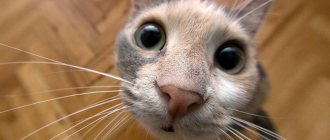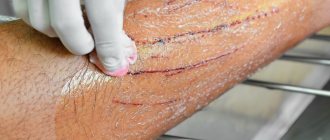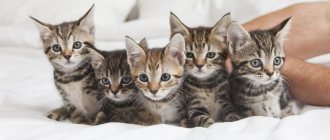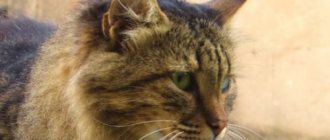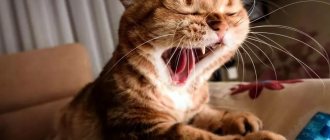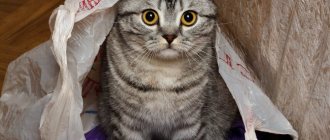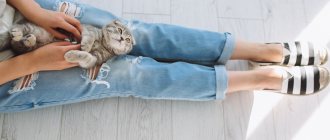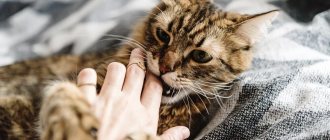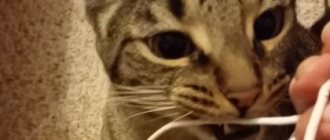11781Administration
1
Owners of furry cats often complain that their cat licks their head. This is not very pleasant, not beautiful and makes people uncomfortable. The question itself arises, why do they do this? What reasons? So what should I do?
The fact that all cats lick themselves or their relatives is quite normal. Everyone knows that these animals are clean, and this is how they remove excess dirt from their fur. Why does a person undergo such a ritual, and what does it mean?
© shutterstock
The cat licks your hair because he likes you
- Veterinarians say that licking hair may be a cat's way of expressing its feelings.
- Mutual care is a common bonding behavior between cats. As the owner of at least two pets, you're probably used to seeing cats lick each other.
- In addition, mutual care may be the result of a revival of the maternal instinct. Although this explanation is not fully confirmed in reality. After all, this behavior is also observed in cats.
- Another theory is that this is a way for cats to relax themselves, reducing stress and tension.
Cats that bond very closely with their guardian may make the guardian the target of the above behavior. The focus will automatically be on areas with hair (for example, we have the most of it on our heads). This is completely normal, and if your cat is licking individual strands of hair, there is nothing to worry about. Give him your love and offer him a solid dose of affection. After all, he finally washed your hair.
Causes
A cat can lick the head of any family member for various reasons. The first, and most basic, is a natural craving for cleanliness. This way they are trying to show they care and show that they care about you.
Other reasons:
- The appearance of love. Just as a cat licks its newborn kitten, your pet will lick you too. This ritual, special for them, contains all the tenderness, love and care that only a cat can give you;
- Often, a cat licks the hair, hands or face of the owner in order to get something tasty. When he sees a treat in your hands, the pet shows all his tricks to get it;
- Craving for dominance. Sometimes, an animal wants to show who is boss in the house, and by licking a person, it shows its dominance. Like a mother who takes care of her child in every possible way, a cat shows care for its owner;
- If the cat is very constrained and tense while licking the hair, then this means that the owner completely dominates her. This is a direct signal of the pet feeling uncomfortable; he is tense all the time, and this can negatively affect the animal’s psychological and physical health;
- If your cat is licking the hair on its head, this may indicate that it is simply bored. The tailed friend lacks attention. If such impulses are constant, you should worry about the state of her psychological health and visit a specialist to fully examine and solve the problem;
- If a person has strong and pungent odors, the cat tries to rid him of them. Any cosmetics, perfumes, creams, ointments, and even sweat secretions are perceived harshly by the pet and, in their opinion, are dangerous. Therefore, by licking the owner, the animal wants to protect him and himself from the impending danger;
- Presence of diseases . It is worth examining the cat well, monitoring its behavior and possible accompanying symptoms. Excessive licking may indicate the presence of parasites, dermatitis, allergic reactions, skin irritations, rashes and various infections.
A cat licks a person's hair for its taste or smell.
- According to leading veterinarians, some cats may simply enjoy the taste of the shampoo and other hair products you use. However, if you use hairspray, hair mousse or other styling products, it is best not to let your cat lick your hair. After all, you don’t want him to consume chemicals contained in cosmetics - they can harm him.
- Moreover, the oil produced by the scalp may also seem tasty to pets. Some cats may also be fascinated by the texture of their fur.
How can you tell if your cat has problems?
You should contact your veterinarian if you notice the following symptoms in your pet:
- Dry cough. This is how the pet tries to provoke a gag reflex.
- Vomit. It helps when there is not much hair.
- Changes in appetite. A hungry cat asks for food, but since its stomach is full, it cannot eat.
- Constipation, bloating. When the hair mass descends into the intestines, it provokes constipation and abdominal pain.
- Apathy, drowsiness, increased salivation. At the stage of intoxication of the body, the cat becomes sleepy, lethargic, vomiting and diarrhea are possible. In this case, it is necessary to urgently take the animal to a veterinary clinic.
It is clear that it is quite difficult to completely rid a cat of lost hair and prevent it from entering the stomach. However, there are a number of preventive measures that will help rid your pet of accumulated hairs in a timely manner.
Subscribe to our newsletter and get a free veterinary consultation
Thanks for subscribing!
The cat licks its owner's hair to mark territory
Whether you've been out all day or just popped into the nearest store, your cat will immediately pick up on the other scents you've picked up along the way. Your furry friend will want to take them off your “fur” so you smell like him. So now you belong to his “domain”. By licking, he marked you, thereby informing other cats (if you have more than one) to stay away from you.
Cat eats hair from the floor
Sometimes hair falls from our head straight to the floor. We cannot notice this, nor the fact that the pet found and ate them. This unwanted behavior is difficult to control. Of course, if you see it, you need to stop the cat from doing this and remove the hair from its mouth. But, unfortunately, more often this happens in our absence.
What are the dangers of eating hair? Firstly, a clump of your hair, like your own fur, can get stuck somewhere in the cat's intestines, causing an obstruction. Then he will need to eat grass to pull out or push the mat further. In rare cases, surgery is required.
How to stop this behavior?
- If you don't want your cat to lick your hair, try to discourage her from doing so.
- If you pet your cat or talk to him during this training ritual, you will let him know that you approve of this action.
- When your cat tries to lick your hair, let him know that you don't like it. Just get up and walk away from your pet.
- If you think your hair products may be causing you to become overly interested, change them to something else. Your hair may no longer be as attractive to your cat. Cats generally don't like the smell of citrus fruits, so you can try lemon-scented shampoos and body washes.
The cat buries itself in the hair and sucks (chews) it
This behavior is more typical for kittens, although as a relic of childhood it can persist in adults. The fact is that the kitten may perceive your hair as its mother's fur and rummage through it in search of a nipple with milk.
Sometimes the fact that an adult cat needs the feeling of a mother is the result of childhood psychotrauma (for example, early separation from her), and this cannot be treated.
There is nothing terrible about a cat sucking hair, but it is also pleasant. Therefore, if a cat does this, try to push him away with the prohibiting word “fu”, “no” or any other word that you teach your pet.
You can also try spritzing citrus-scented water on your hair, which cats don't like.
As a last resort, you will have to sleep in a special cap for the first time, until the kitten grows up, or not let the cat sleep with you at all.
How to remove fur from a cat's stomach?
If you cannot prevent this problem from occurring, you should think about how to solve it. There are several ways:
- Hair removal paste. Thanks to its composition, the paste promotes the natural removal of hair from the cat’s gastrointestinal tract. In addition, it improves appetite and digestion.
However, this paste may be useless if there is too much hair. Before use, consultation with a veterinarian is necessary.
- Hair removal tablets. According to the principle of action, they are similar to paste.
- Food for hair removal. For example, the Royal Canin line includes Hairball Care food to prevent the formation of hairballs in a cat’s stomach.
Login to the site
As our mail shows, this is not such a rare occurrence. Cats show a noticeable interest in their master’s hair and “look after” it. Sometimes they “comb” it, sometimes they lick it. Sometimes they even try to fix the head of their beloved owner with their paws. Our article will hopefully shed some light on this pattern of feline behavior.
Tell me, have you now recognized yourself and your pet? Then, with a high degree of confidence, we can assume that your cat actively uses grooming as one of the main models of social behavior. What does this look like in practice? Something similar is often noticed by owners of several pets. When peace and harmony reign in the house, furry pets love to tidy each other up, lick each other, etc. Cats transfer this model of behavior to their owners, apparently considering them to be part of one big family. What is “licking” in a cat’s understanding? This is the transfer of one’s own scent, a kind of mark in the spirit of “you are only mine.” A large and friendly family, accordingly, should smell the same.
There are also some oddities. A pet can show a completely unexpected, sudden interest in the owner’s hair. And again it's about smells. So, he may “like” your new shampoo or other cosmetic product. Therefore, do not think that a great stylist is sleeping inside your pet. Consider cat care as a compliment: not every person is accepted into a cat family.
Perhaps some time ago you yourself unwittingly reinforced this behavior. It all happened by chance, during play or petting. The cat accidentally touched the hair, in response you encouraged it - stroked it or even gave it a treat. And they themselves did not pay attention to what happened. And the purr connected both of these events in her head and is now trying to please her owner.
But sometimes something pleasant doesn’t come out. The pet tangles its hair and sometimes starts sucking on it. How should we evaluate this behavior? Perhaps we are dealing with some echo of the stress suffered by the animal. In such a unique way, a cat seeks protection and consolation from its owner. Or your “purry” has developed the so-called “pica” - simply put, a perversion of taste. In the first case, try to find out whether the cat might have experienced severe fright or stress. If the matter is a perversion of taste, then, as a rule, the matter is not limited to hair alone - plastic bags, wool, paper, etc. are also used. Some breeds (Siamese, Burmese, Orientals, etc.), by the way, are more likely than others to tend to suck and chew inedible things and objects.
In any case, we do not recommend encouraging such behavior, and here’s why. Surely you have come across “wool balls” - when a cat regurgitates lumps of hair that got into the stomach after washing itself. Now imagine what happens when strands of human hair enter a cat's stomach.
Strictly speaking, taste perversion is a rather serious condition; your pet seriously risks its health. Just in case, be sure to consult your veterinarian.
Provide your pet with alternative options - for example, special soft toys work well. And don't rush to get upset. What if they finally gave you an exquisite compliment?
Source: https://zen.yandex.ru/ilikepet
What to do with your pet’s “oddities”
In search of the prematurely lost sensations of childhood, the cat tries to experience them by licking its tail or paw. It all depends on the time when the cat started sucking its tail. If the kitten is very small, you should not deprive him of this pleasure. The situation is completely different if the adult continues to suck the hair on its tail with stubborn consistency. In such cases, he risks harming his health, namely :
- Stomach blockage . Constantly licking the tail can lead to excessive accumulation of hair debris in the cat's intestines. Hairs that are not removed by the body can pose a threat to the health of the animal and even lead it to the operating table.
- Deterioration of the tail . The owner should check the condition of this part of the pet’s body daily. Sores may appear on the skin from frequent exposure to cat teeth and saliva. It is important to prevent infection from getting into them, which can lead to the formation of purulent abscesses.
- Baldness of the skin . Constantly being in the mouth of a quadruped can damage the hairs on the tail, as a result of which the latter may begin to go bald. This is not the most beneficial state for the pet’s body, not to mention the aesthetic side of the issue.
If the purr sucks its tail infrequently and does not cause injury to it, nothing needs to be done about this situation.
© shutterstock
